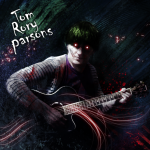
Since this is my first blog post, I had better say a bit about me. I am a composer, sound designer, editor and sometimes producer for audio drama, podcasts and short films. Small Town Horror, Organism and Pulp Pourri Theatre are a few of the things I have composed music for. I also have a few music qualifications I have built up over the years.
Having a disability or condition certainly can have an effect on your everyday life and also in your work. In this blog, I shall discuss my conditions and how they affect me and how I get around this so I am able to compose music.
I was born with Asperger’s syndrome. This affects my social skills. I find social situations in big groups extremely hard. Some people may think I am rude or abrupt in the way I speak, but I do not mean things maliciously; the Asperger’s makes me honest and blunt about my thoughts or feelings. Lots of people assume having Asperger’s syndrome means you are an emotionless robot, whereas many of us are overly sensitive in our emotions. While growing up, I was consumed by so many films, games and TV shows. I enjoyed monitoring the range of emotions and have tried my best to help emphasize and create these feelings in my own music. Most people with Asperger’s syndrome have a high level of intelligence; this has helped me solve issues and problems in different ways and helps me with leadership roles.
The Asperger’s also makes me sensitive to sound and touch. This means that sounds that are loud or of certain frequencies can cause me pain and also lead to headaches. Now, this goes up and down depending on my energy levels, how stressed I am and whether I am ill. I may take a certain level of sound one day without problem, but not even manage people talking to me the next. This can be very frustrating when one wants to get an idea out quickly. I have gotten around this by using lower volume levels in the composing process when I have a bad day. Asperger’s is also linked to a number of phobias and sleep problems that would take far to long to explain in this blog. Some I find difficult even to talk about.
My next condition is Dyspraxia, which I was also born with. This condition had a profound effect on me as a child, but since puberty the majority of these issues have improved. It affects my coordination and my ability to tune out certain sounds. (For example, if I am in a big group of people I am unlikely to speak at all: knowing when to speak and zone in on any particular conversation is very difficult.)
I have tinnitus, which started in 2011. This creates a range of irritating noises in my head that no one else can hear. Lack of sleep, yawning, travelling, illness, stress, back pain and anxiety can all make it worse. This can make work difficult on bad days because the stress and anxiety caused by the noise can affect my confidence and the speed of my work. I can’t use headphones as it makes me dizzy, causes pain and also affects my tinnitus.
Scoliosis began to develop in 2016. Years of hunching over to hide myself away at school and years of poor sitting has led to a bend in my spine. Although I have made efforts to improve this, I have pain every single day ranging from “aww that’s not bad” to “ahhh I think I am going to be sick”. This can affect my work because sitting down in front of a computer for long periods causes more frequent and worse pain.
Now, for those of you who have conditions, I know it can be awfully hard, but if you have talent for something and want to do certain things, you should try the best you can to achieve them. The conditions are going to limit what you can do or the amount; however, we must find ways around things. If we can’t do tasks the way everyone else is doing them, find another way – it might be harder, it may take longer, but we do what we can to do the things we need to get done.
Usually a client may not be aware or even care what conditions I have. I don’t think I have ever abandoned a music project because of my disability, which I feel happy about, but I know it could be possible in the future.
There is a lack of understanding around disabilities and conditions especially when it comes to mental health. Most people assume that you can see if somebody is disabled just by looking at them – and there are some people who find people’s disabilities or health conditions to be an inconvenience to them. Well we can assure you it is often an inconvenience to us.
Lots of us disabled folk may struggle, but I see many of us doing and creating such wonderful things – so let’s keep doing it!
Feel free to message me any questions and if you are interested check out my friends youtube channel who it interviewing a number of people about their conditions I featured in the first episode Listen Here

This is a really interesting blog post – pretty inspiring, too. Thanks.
Glad you enjoyed it i’ll be posting another blog next month 🙂
Wow, well done Tom, a very inspiring blog from a very different young man I met when he started secondary school, always knew you would make something of yourself